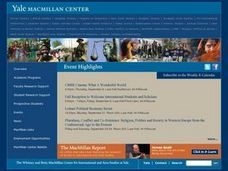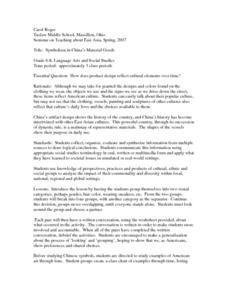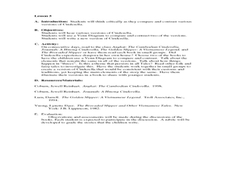Curated OER
China's Ethnic Minorities
Third graders are introduced to various Chinese ethnic groups. They consider how geography affects ethnic groups and examine artifacts produced by Chinese peoples. They prepare a presentation of their research and artifact interpretation.
Curated OER
Defining Ethnic Minorities in China
Ninth graders, in groups, research some of China's 56 identified ethnic groups. They prepare maps and posters to display their research.
Curated OER
Yi Peoples--Sanctioning Taboo In China
Learners identify the minority and ethnic groups in China. Using the internet, they discover the types of languages spoken and research the policies in place to manage minorities. In groups, they role-play the different ethnic groups...
Curated OER
Sports in China: What And Why They Play?
Students study several different types of Chinese sports played throughout history in China. They examine the historical perspective of the importance of sports in Chinese culture and create a final project using information about three...
Curated OER
Farming in a Fishbowl: How Ethnic Groups in
Seventh graders research Chinese agricultural needs and practices. They conduct an experiment with aquaculture and germinated rice as they take measurements and apply the scientific method.
Curated OER
Zhuang: China's Largest Minority
Students, in groups, research Chinese ethnic minorities such as the Zhuang population. They identify the characteristics of different ethnic groups and consider the lives of ethnic groups worldwide.
Curated OER
Yaks, Yurts, and Yogurt: A Look at China's Autonomous Regions
Learners are introduced to five Chinese geographical areas. They, in groups, research these areas and develop presentations including information on the physical characteristics, climate, elevation, agriculture and language.
Curated OER
Who Are These Chinese People?
High schoolers research the Han, a main Chinese ethnic group and the Hui, another numerous group. They write a paper about the Hui including geography, religion, eating habits, languages, politics and customs.
Curated OER
Symbolism in China's Material Goods
Young scholars make a generalization about the process of 'looking' and 'grouping', hoping to show that we, as Americans, show preferences and shared choices. They study examples of American art through time and create a class...
Curated OER
Chinese New Year: Paper Lanterns Lesson Plan
First graders examine a typical Chinese New Year celebration. As a class, they identify the traditions and values used and discuss how they are unique to China. To end the activity, they take measurements to make their own paper...
Curated OER
Guess Who ?
Students, in groups, research Chinese ethnic minorities. They create a brochure to present their findings.
Curated OER
Miao Minorities
Students conduct Internet research to identify the cultural aspects of the Miao minority group from China. They, in groups, create a brochure with their research and write an essay on the predicted future of the Miao culture.
Curated OER
Thinking About Diversity: One Student's View
Students are asked how would you describe your yourself (Racial/Ethnic). Students read Little Boxes, where it is discussed that the author describes that backgrounds of her parents. They continue to read where they still need to come...
Curated OER
Chinese Minority Cultures
Seventh graders identify the elements that characterize culture in literature.
Students analyze the representation of Chinese minority peoples
through textbooks. Students identify and interpret the differences among the people of China.
Curated OER
Word Play
Students examine the history of Chinese American artist Xu Bing. In this multicultural lesson, students collaborate in small groups to identify letters in the artist's work, and brainstorm how they would create their own images from...
Curated OER
The Ancient Mediterranean: Trade, Contact, and Cultural Diffusion
Ninth graders begin the lesson by being introduced to the basic terms of economics. In groups, they discover how they are affected by trade because of the clothes they wear and foods they eat. Using primary sources, they examine the...
Curated OER
Mongol Dynasty
Students identify and analyze the Yuan Dynasty; the Kings and Kingdoms; who the Mongols were and what they did; the Mongol Conquest of China; the Four Class Systems; the Genghis Kahn's rise to power; the Genghis Khan- Conquests; the...
Curated OER
Southeast Asian Folktales
Fifth graders locate and identify the countries of Southeast Asia on a map. In groups, they compare and contrast photographs and artifacts from their own lives with those living in Asia. They write their own folktales based off of...
Curated OER
Why Are Celebrations Important?
Students complete a variety of activities in their study of Chinese culture. They explore the Chinese New Year, zodiac, calligraphy, dragon kites, lanterns, games, and songs among others.
Curated OER
The Clothing of the Buddha
High schoolers discuss the idea of cultural diffusion by examining how the sculptural portrayal of the Buddha's clothing evolved in Japanese and Chinese art. This lesson concludes with a group project and presentation.
Curated OER
The Medium And The Message
Students compare and contrast Buddhist sculpture in varying materials through in-class discussions and small cooperative learning groups. This instructional activity includes possible instructional activity extensions.
Curated OER
Rethinking Time, Age, And the Calendar
Students creat personal timelines, marking key events in their lives. They discuss the different events with a small group. They analyze how Western Civilization influenced their timeline in comparison to Eastern Asia.
Curated OER
Introduction to Korea
Students explore the culture of Korea. In this Korean culture lesson, students examine visual and textual works regarding Korea. Students also examine dance, architecture, and food of the country.
Curated OER
Word Play
Students examine the Japanese folktale, Monkeys Grasp for the Moon. In this multicultural literature instructional activity, students discuss the theme of the folktale. Students choose animal folktales from other Asian cultures for...

























